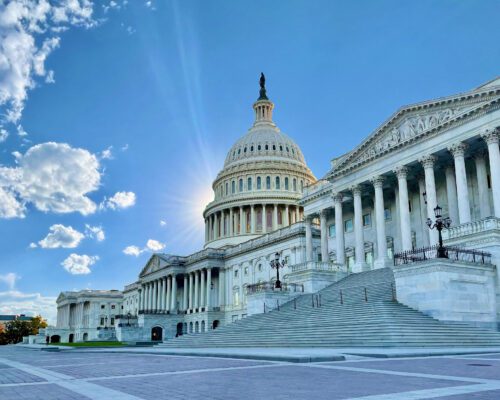Freedom to live according to one’s deeply held religious convictions is a tenant of Baptist faith. But why is that so? Below is a resource for Southern Baptists on religious liberty that explains how the Bible, Church history, and the Baptist Faith & Message informs this foundational position.
Government is ordained by God and exists to promote justice and order the civil sphere
Government is ordained by God for the promotion of civil order and justice in society. From the Noahic covenant, which served to set limits on how individuals interacted with one another after the Fall—requiring life for those who took a life—to Paul’s reminder to church at Rome about submission to government, government exists to punish evil doers and restrain injustice (Gen. 9:1-7; Rom. 13:1-7).
Practically, this can mean everything from the building of roads and setting of safety standards as well as the just enforcement of laws and physical defense of citizens. As an institution of God, it is good for its own sake, not just as a result of the Fall and sin’s entrance into the world. Christians should desire the government to further justice and human flourishing as its proper end.
God alone is Lord of the conscience.
In the same passage where Jesus reminds his disciples to render unto Caesar what is Caesar’s, he also says that there are things which belong rightly to God, not Caesar (Matt. 22:15-22). This is a reminder that God alone is Lord of the conscience, and the government should not interfere with the sincere religious convictions of individuals. In the words of John Leland, Baptist preacher and religious liberty advocate, if the government won’t answer for a person before the judgment seat of Christ, it should not interfere with an individual’s religion in the present.
Baptists have historically held that though the conscience is not infallible, recognizing that it can be malformed because of sin’s effects, it should be inviolable. When rightly normed by Scripture, individuals should live in accordance with conscience rather than do what they think to be sin (Rom. 14:1-12).
Christians owe obedience to the state as a divine institution of God.
As a divine institution of God, Christians are to give obedience to government when it exercises its power justly within its sphere of authority. The command to give obedience to government is not a blessing of all the uses of government’s power, but a submission to the authority established by God (Rom. 13:1-7; 1 Pet. 2:14). Christians should resist commands from the government that call them to sin or reject the teachings of Christ.
However, in other instances, Christians should willingly submit to the authority instituted by God, availing themselves of all the rights of citizens for protest and redress of grievances. They should do so while also praying for all authorities and leaders to further promote justice and justly govern society (1 Tim. 2:1-4).
The church and state should not be united
As the Baptist Faith & Message 2000 declares, “A free church in a free state is the Christian ideal…”
Baptists have consistently held that the church and state are to remain distinct from one another, not to promote a secular state, but rather to prevent the unjust use of power by the state inside the church. As early American Baptist Roger Williams described it, the hedge of protection exists to protect the garden of the church from the wilderness of the state. A state which can interfere with the church’s governance is one that will seek to corrupt and control the church based on cultural norms.
As Baptists, we affirm that entrance into the church is not coterminous with entrance into the state, and reject any nationalized churches. Rather, Baptists have historically held that the church and state are distinct, even as they have called for Christians to seek the promotion of justice and virtue in the public square.
Religious liberty is the canary in the coal mine of societal health. A government which can attempt to control your devotion and worship is a government which seeks to control the most basic part of who you are.
Religious liberty in Baptist history
This is why the Baptist Faith & Message (2000) states unequivocally that “A free church in a free state is the Christian ideal.” That is a truth that has been preserved and defended by Baptists for over 400 years, from Thomas Helwys in England to Roger Williams, John Leland, and Isaac Backus in early America, and modern examples such as George Truett. When persecuted, especially under the hand of state or establishment churches, they reminded the state of the limits of its authority. Their advocacy was not limited only to self-interest, but a recognition that all have the right to worship God (or not) in accordance with their conscience because only the individual will stand before God and give an account for their soul.
Helwys, one of the earliest English Baptists, issued what is likely the first call for universal religious liberty in the English language when he said, “Let them be heretics, Turks, Jews or whatsoever, it appertains not to the earthly power to punish them in the least measure.” This call would cost him his life because in doing so he would denounce the power of the king to jail and punish heretics with the power of the sword.
Today’s challenges from within to religious liberty
Today, there are some who would have Christians believe that our current cultural situation’s antipathy toward Christian morality and biblical truth is too dire for us to uphold such principles as religious liberty and its relation to the liberal democratic order with an emphasis on individual rights and basic freedoms. They assert that the environment of classical liberalism is toxic to faith and has led to an increasingly secular square and the rise of an individualism unmired from notions of the common good.
Instead, these critics call for a state project that will provide a moral framework supporting the church—though they are conspicuously quiet about which denomination should be preferred. As one author stated recently, the greater problem to be faced is the sexual revolution and gender confusion of our age, not the fear that one religious group will force another to conform.
The sexual revolution is deeply concerning, and Christians should oppose it and limitations on religious liberty at the same time. Baptists can do both without any problem or need to look to other traditions. A commitment to religious liberty is not just a practical outgrowth of Baptist persecution, but a result of Baptists’ commitment to reading and interpreting the scriptures. Those are the same scriptures that tell us that gender and sexuality is part of God’s good design.
Those who think that Baptists are incapable of meeting the challenges of the day without changing their tactics should remember that our weapons have always been spiritual, not simply temporal.
Just as we oppose gender ideology that seeks to conform the body to a mistaken understanding of self, Christians should oppose any attempt to coerce the soul and force outward conformity. Those who call for such coercion are saying either that these heretics are misguided and in need of correction which the state can provide or that outward religious action is more important than true religious conviction. Thus, they would use the state to make hypocrites, choosing outward conformity over sincerity of belief.
A lesson from the Reformation
Again, a perspective of church history can help us to understand that the ability to conform our outer worship to our inner understanding of what God requires has been a hard fought battle. In England, after the break from Rome, there were intense periods where the established church fought over whether certain outer liturgies were essential to the faith or adiaphora (things left to conscience and personal preference). At various points, certain forms of dress and use of particular prayer books were the established practice, and nonconformists were persecuted and stripped of their rights and titles and positions in the church.
The established church often told this small group that these were matters which did not cause any damage to the soul. You can still preach the gospel, just do so in a miter (a headdress worn by bishops). You can still offer the sacraments, just make sure that you are using the liturgy from the official prayer book. But the nonconformists boldly refused, saying that they intended to carry the reformation to its fullest extent and that these actions were not just adiaphora. The response of the church was to jail, persecute, and in some instances execute these nonconformists. For the state church, the threat of heterodox belief and practice was reason enough to warrant persecution, and when they controlled the levers of state power they were all too keen to enact it.
As Baptists, we know how this story plays out. What begins with compulsion on non-believers ultimately ends up as compulsion on believers of a different tradition, with the circle growing ever smaller and smaller. But it is not out of practical self-interest that Baptists push against trends of illiberalism and state-sanctioned coercion. It is a recognition that we live not in the inaugurated reign of Christ, but rather in the time between Christ’s ascension and return, the already-not yet. In this time of contestation, we recognize that religious liberty (and the value of principled pluralism) are the framework in which we operate. The state cannot coerce belief, but the church can persuade individuals.
Those, who would flee to the government for state support, such as theonomists who seek to enshrine Old Testament laws in American civil law, betray their own fear of the weakness of their positions. In the words of John Leland, another Baptist defender of religious liberty, “Truth disdains the aid of the law for its own defence … it is error, and error alone, that needs human support; and whenever men fly to the law or sword to protect their system of religion and force it upon others, it is evident that they have something in their system that will not bear the light, and stand upon the basis of truth.”
A commitment to blessings and principles of religious liberty is a recognition that neither the state, or any state-sponsored church, will answer for our souls on Judgment Day. We will stand there alone, answering for our own actions. Thus, it is a recognition of the limits of government power to bring about the kingdom. We must not buy the lie that the canary is a lamentable, but necessary sacrifice in the fight against secularism. Because an environment too toxic for religious liberty is an environment that seeks to trade the power of God for the power of the state. And that is a bargain no Christian should make.
Resources
- Andrew Walker, Liberty for All
- Robert Louis Wilken, Liberty in the Things of God: The Christian Origins of Religious Freedom
- Baptist writings on religious liberty:
- Thomas Helwys, A Short Declaration of the Mystery of Iniquity
- Roger Williams, The Bloody Tenent & The Bloody Tenent Yet More Bloody
- John Leland, “The Rights of Conscience Inalienable”
- George Truett, “Baptists and Religious Liberty”
- Jonathan Leeman, “Christian Nationalism Misrepresents Jesus, So We Should Reject It” (9Marks)
- Paul Miller, The Religion of American Greatness: What’s Wrong with Christian Nationalism
- Trevin Wax’s 3 part series on Christian political activity: 1, 2, 3 (TGC)
Baptist Faith & Message (2000): Article XVII. Religious Liberty
God alone is Lord of the conscience, and He has left it free from the doctrines and commandments of men which are contrary to His Word or not contained in it. Church and state should be separate. The state owes to every church protection and full freedom in the pursuit of its spiritual ends. In providing for such freedom no ecclesiastical group or denomination should be favored by the state more than others. Civil government being ordained of God, it is the duty of Christians to render loyal obedience thereto in all things not contrary to the revealed will of God. The church should not resort to the civil power to carry on its work. The gospel of Christ contemplates spiritual means alone for the pursuit of its ends. The state has no right to impose penalties for religious opinions of any kind. The state has no right to impose taxes for the support of any form of religion. A free church in a free state is the Christian ideal, and this implies the right of free and unhindered access to God on the part of all men, and the right to form and propagate opinions in the sphere of religion without interference by the civil power.
Genesis 1:27; 2:7; Matthew 6:6-7,24; 16:26; 22:21; John 8:36; Acts 4:19-20; Romans 6:1-2; 13:1-7; Galatians 5:1,13; Philippians 3:20; 1 Timothy 2:1-2; James 4:12; 1 Peter 2:12-17; 3:11-17; 4:12-19.









